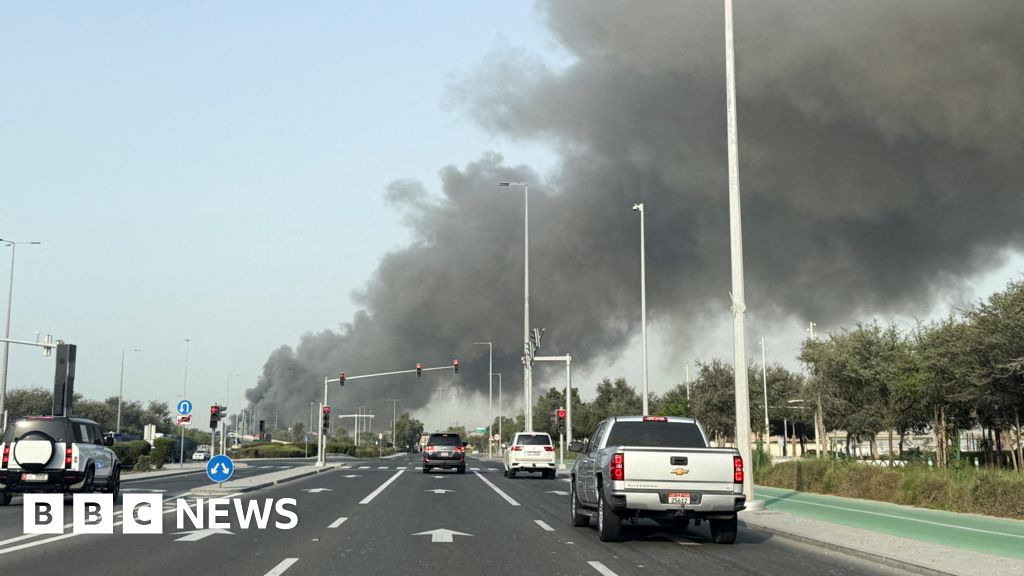European analysts worry conflict in the Middle East could be a destabilizing factor in already volatile regions of the African continent.
"If the conflict between Israel and Iran escalates further, there is a risk that the various interconnected wars around the Red Sea could also expand," Hendrik Maihack, of the German Friedrich Ebert Foundation (FES), told DW.
He says the greatest danger would be to the Horn of Africa, a region "currently in its deepest crisis in nearly 30 years."
"Iran cooperates with the Houthi rebels in Yemen, who in turn also collaborate with the Al-Shabab militia in Somalia," Maihack says, adding such interconnected alliances are the reason Germany and Europe must look beyond the wars in the Middle East and Ukraine. With conflicts across Africa "rather increasing than decreasing" — there could be consequences for Europe.
 Sudan's hunger crisis could be exacerbated by conflict in the Middle East and the allied militias in the Horn of AfricaImage: AFP
Sudan's hunger crisis could be exacerbated by conflict in the Middle East and the allied militias in the Horn of AfricaImage: AFP"Where foreign policy attention and resources for humanitarian and development cooperation diminish, many African countries fear falling further out of the spotlight of Western support," Maihack says.
Guido Lanfranchi from the Clingendael Institute for International Relations in the Netherlands told DW the cooperation between the military Houthi group, supported by Iran, and the Al-Shabab terrorist militias in Somaliahas intensified.
"Maintaining these connections appears to be in the interest of both groups," the conflict analyst says, but adds it is uncertain to what extent Iran can continue supporting the Houthis.
Horn of Africa has strategic importance for Israel and Iran
The Horn of Africa and Red Sea regions, which include Egypt, Sudan, Saudi Arabia, Yemen, Israel, Djibouti,Ethiopia and Somalia are geo-strategically important to both Iran and Israel, Lanfranchi says, with Iran recently supplying weapons to the Sudanese Armed Forces (SAF).
"Israel maintains close relations with Ethiopia, and in the last few months alone there have been several meetings at ministerial level between the two sides," Lanfranchi says.
While Israel's role in Sudan is not entirely clear, Lanfranchi says Israel had relations with both the SAF and the RSF (Rapid Support Forces) factions before the Sudanese civil war broke out in April 2023.
 War in the Middle East threatens trade routes on the Red Seaand along the Horn of AfricaImage: Solomon Muchie/DW
War in the Middle East threatens trade routes on the Red Seaand along the Horn of AfricaImage: Solomon Muchie/DWBut according to Romane Dideberg of the London-based think tank Chatham House, Iran and Israel's limited economic and diplomatic overall footprint in Africa so far means the fallout from the Iran-Israel conflict is currently "mainly indirect geopolitical effects."
"Both countries have invested very little in Africa and don't really have an Africa strategy like similar players in the region," she told DW.
These effects include potential disruption to trade, increased market instability, rising oil prices, and growing economic pressure. Neverthelss, Dideberg says, energy prices could still skyrocket, and with international political and military attention now focused elsewhere, "security gaps" on the continent could emerge.
Qatar's mediating role in Congo weakened
Other Middle East players, however, have vested interested in certain African nations.
"Qatar has played a very active role in mediating in various African countries in recent years and most recently played a leading role in the regional mediation efforts between Rwanda and the Democratic Republic of Congo," Dideberg tells DW.
 Mediation by the Emir of Qatar (center) led to a meeting between Rwandan President Paul Kagame (left) and DRC President Felix Tshisekedi (right) in March 2025Image: MOFA QATAR/AFP
Mediation by the Emir of Qatar (center) led to a meeting between Rwandan President Paul Kagame (left) and DRC President Felix Tshisekedi (right) in March 2025Image: MOFA QATAR/AFPBut following an Iranian attack on a United States airbase in Qatar, further threats to Qatar could now follow: "So if they are attacked directly, that could diminish their role. They provided this quiet diplomacy and support in the background, while all other diplomatic channels failed."
Qatar managed to bring RwandanPresident Paul Kagame and Felix Tshisekedi, President of the DRC, to the negotiating table in early 2025, after the two leaders avoided each other for months amid escalating violence in the eastern DRC bordering Rwanda.
Iran retreating in West Africa
In West Africa, Iran has invested in the Sahel countries, says Ulf Laessing of the Konrad Adenauer Foundation (KAS) in Mali. Iran has tried to provide an alternative to European partners, such as France.
"For example, an agreement was concluded with Niger, which is officially about energy cooperation," Laessing told DW.
Despite alleged military deals in exchange for access to resources, Laessing says the Israel-Iran conflict has taken away Iran's capacity to be a player in West Africa. Military-ruled Sahel countries ruled could therefore receive less support, such as for drone purchases, than previously hoped.
Adapted by Silja Fröhlich
Edited by Cai Nebe
 Mali, Niger and Burkina Faso, headed by military junta leaders Assimi Goita, Abdourahamane Tiani, and Ibrahim Traore respectively formed their own Alliance of Sahel StatesImage: Mahamadou Hamidou/REUTERS
Mali, Niger and Burkina Faso, headed by military junta leaders Assimi Goita, Abdourahamane Tiani, and Ibrahim Traore respectively formed their own Alliance of Sahel StatesImage: Mahamadou Hamidou/REUTERS
 8 months ago
8
8 months ago
8








